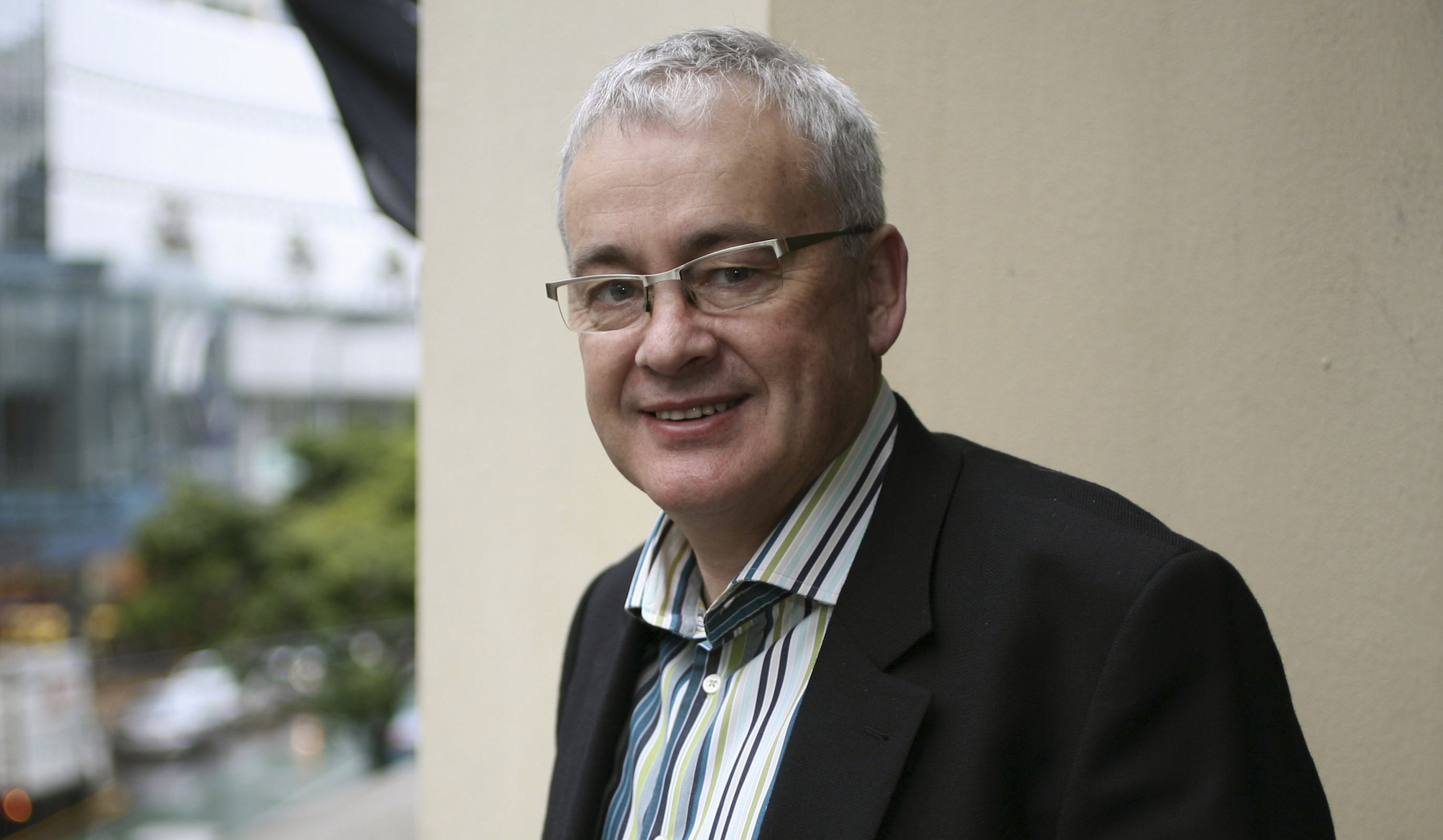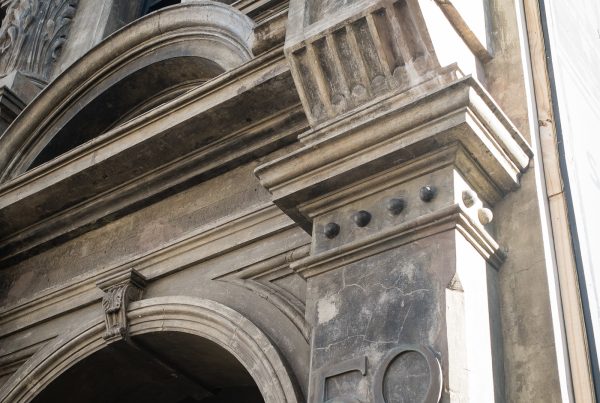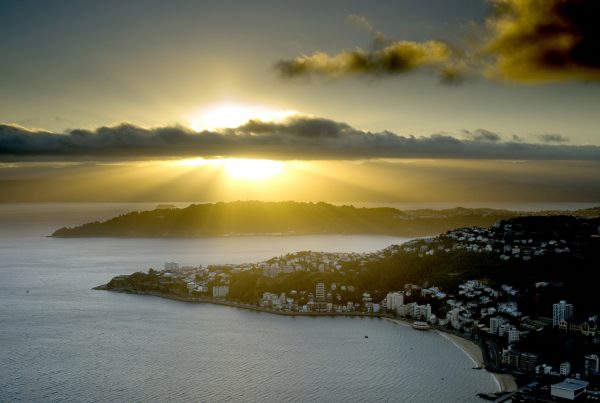
In his latest match he was drafted in as promotional striker for the Phoenix Football Club’s international Football United venture, which saw top teams from the venerable Newcastle United and West Ham clubs play official English Premier League matches at the Cake Tin and in Dunedin and Auckland. The job was to boost ticket sales, which was spectacularly successful after Gerry’s efforts.
His kick-off was a pre-tour Kiwi hospitality barbecue for the visiting teams at the Provenance Village Butcher in London, run by New Zealanders Tom and Guy Gibson and Erin Hurst, at which Welcome to New Zealand packs were handed out to the players, an event ripe for media coverage to oil the stadium turnstiles for Phoenix.

Wellington Phoenix general manager David Dome featured in Gerry’s Football United Kiwi products welcome pack
The pass to the wing was bringing New Zealand companies in as partners for Phoenix. Those companies provided food, beverages and other Kiwi products, including copies of FishHead, to fill the welcome packs provided by Kathmandu. In return, they gained benefit from media coverage in Britain and New Zealand.
“It wasn’t that hard,” says Gerry, “because all those companies could see the potential as soon as the idea was mooted.”
The real reason it all came together is that Gerry is a compulsive organiser, whether within the Wellington arts community and organisations like the Wellington Racing Club or running gigantic public campaigns. Organising is his oxygen — it gets him bubbling with the exuberance of a nine-year-old given a new puppy — and he has a magical ability to enthuse everyone involved.
Gerry’s campaigns have won him awards from his peers both in New Zealand and overseas. One of the most famous was for the Fire Service, stating the sober message that smoke can kill you without waking you. It led to smoke alarms being made compulsory in homes. His best work has never made him rich. The two campaigns of which he is proudest were done pro bono, because he believed they needed to be done. They were for the betterment of two things nearest his heart — beer and Wellington.
He was particularly galvanised in 2001 when Dominion Breweries closed the 150-year-old Greymouth Monteith’s brewery with the loss of 14 jobs, intending to move the operation to Auckland (supposedly because the Greymouth brewery could not handle the increased demand for its beer).
Within 12 hours of the closure announcement, expatriate West Coasters living in Wellington were organised to lead a boycott of not only Monteith’s beers but also the full range of DB products. The campaign soon spread nationwide and within five days DB was forced to reverse its decision. The Greymouth brewery still operates profitably and its new-found fame has made it a tourist attraction, adding further value for its owners.
A second campaign in 2000 mobilised public opinion against a secretive Wellington City Council plan to allow massive waterfront development that would cut off the city from the harbour. That led to the plan, called Variation 17, being abandoned and helped strengthen citizens’ lobby groups.
Gerry says, “The strategy in both cases was straightforward, simply representing what the public wanted to monoliths which, to their cost, simply di
“In the end common sense prevailed and everybody benefits. For a Greymouth Marist High School old boy, the outcomes were pretty satisfying.”
Since then he has worked for the New Zealand Rugby Football Union, national corporations, district health boards and tirelessly on any issue for the West Coast, including the Wildfoods Festival and for families of victims of the Pike River Mine disaster, who include his own. An additional blow was the recent death from cancer of his brother-in-law Dennis Smith, who had a big influence in his life. “He’s the only Pike River miner who’s had a funeral,” Gerry says.
It hasn’t been the only dark time. The complexities of Gerry’s life have brought him downs as well as highs. Slice him open and you’d find family blood as thick as bitumen running in green Irish veins, coal dust in his lungs, and vital organs in the colours of his home now, his beloved capital city. Just walk the waterfront with him, bowed to the breeze — or the gale, it doesn’t matter, we’re still walking — and hear how he loves it.
All that is driven by a heart purple with passion — how could it be else, given his heritage? He never forgets favours, seems humbled when they occur, and will spend the rest of his life returning them. But dealing with the other side of life’s ledger has been hard for a passionate man. For self-preservation he found salvation in Nelson Mandela.
“Mandela said, ‘Resentment is like drinking poison and then hoping it will kill your enemies’,” Gerry says. “He put enmity behind him, put hate behind him, and look what he achieved. That’s the lesson of the man.” Gerry no longer loses sleep over the effect of actions or events, in business or his once turbulent life outside it, that he can’t control.
“I accept them like the weather,” he says. “Of course we’re going to get storms, but in this long, skinny row of islands they soon blow over, and Wellington is in one of the narrowest parts so they pass even quicker. Many a wonderful day begins in fog, and Wellington gets among the highest number of sunshine hours of anywhere in the country.
“I’ve learnt you can enjoy the worst, too, if you’ve got the right coat — and life is made to enjoy, not lament. More than ever now I value any rewards that come my way, particularly those of goodwill and not necessarily cash in the bank. I might well appreciate a couple of seats to a game at the Cake Tin more than the final few dollars of a payment.”
When the iPhone is switched off, Gerry usually is with his gentle partner, pharmacist Alex Broad, and with her cat and dog in their tiny inner-city flat, a short walk or bike ride from most of the places they like. Travelling British West Ham fans crammed into it for parties during the Football United tour. The walls carry Gerry’s memories. He was a trustee of the Wellington Affordable Arts Trust for eight years and its chair for three. It is now the New Zealand Art Show, selling more than $1 million worth of local, affordable artworks over an annual weekend.
Still a sports nut, Gerry was on the committee of the Wellington Racing Club for five years from 2003. He raised more than half a million dollars in funding for the club and led the Trentham track centennial in 2006, bringing trainer Bart Cummings and other luminaries to Wellington for the event. But his first love is still rugby league, which he indulges on the sideline — rain, hail or shine — during matches of the Porirua Vikings Under 18s (he is their president). He says of his role: “The trick is to build the spirit that gets them off the couch and keeps them out of court.”
As for the future — Gerry lives by the certainty that there always is one — don’t be surprised to see him carrying a banner for the international Hilton Hotels & Resorts group, which, it is rumoured, might have decided that the time is right to establish a multi-purpose property in Wellington.
“It will bring a new crowd and more revenue to the city because it will put Wellington on a wider world map,” Gerry says. “It will be revenue the city otherwise would not see because it is from a different clientele the city otherwise would not see. Every great city has to have a Hilton. Paris knows that. I’m sure she’d love to come to the opening of the Wellington Hilton Hotel and Convention Centre — she’d fit right in to the coolest little capital.”
And in lieu of a fee, Gerry might accept a permanent table in a Hilton restaurant where he could argue with a circle of mates, beginning, as always, with the salutation “You bastards…”, then raise a glass and pronounce a grinning “Cheers”. As always.

“I’ve never actually even ridden in one of these, but a boy can dream, can’t he?”




